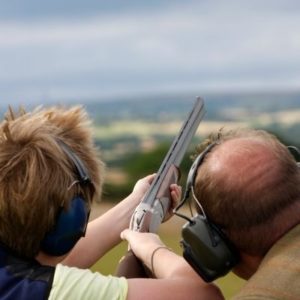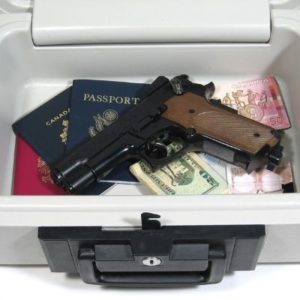What to do if your deceased loved one owned firearms
Consider the following situation, which is all too common in the State of Florida. Your father passed away and after taking care of his final arrangements, you enter his home to gather his personal belongings to display at his funeral. As you reminisce over the fishing photos of the great trips you had with him as a young man, you move on to his closet, where he held his hunting gear. You discover that dad had a lot more firearms then you remembered as a boy. You discover the old hunting rifles, revolvers and shotguns, that still bring back fond memories, but you also find some unfamiliar firearms and attachments, such as ones with mounting rails, pistols grips, and red dot optics. What should you do next?
Determine who has legal authority to handle the firearms
You first should determine whether your father had a Last Will and Testament and/or a trust, in which he nominated a personal representative and/or trustee, to be in charge of his final affairs. If he did, you must find those legal documents as soon as possible and determine who the named fiduciary is in the documents. Contact your father’s lawyer and see if he had an estate plan drafted and executed.
If you are not the fiduciary named in his estate planning documents, contact the named fiduciary and let him or her know about the existence of the firearms. Encourage the fiduciary to take appropriate steps to safeguard the firearms. If you are the fiduciary nominated in the estate planning documents, determine with the estate attorney whether the firearms were transferred to a trust or if they are owned in the sole name of your loved one.
In many trust-based estate plans, the Trustor (person who creates the trust) signs an assignment of personal property, which is a document that transfers ownership of personal property, including firearms, to the trust. If you find an assignment among the trust documents and it appears from the language that the Trustor intended the firearms to be owned by the trust, you will typically have the legal authority to take possession of the firearms for safekeeping and the subsequent transfers.
Determine if someone is prohibited from legally possessing the firearms
After determining whom the fiduciary is in the estate, and beyond safely storing the firearms, it is imperative to recognize that even though you or another family member is nominated in your loved one’s estate planning documents to handle the decedent’s estate/affairs, or is designated to receive a firearm, it may still be illegal for you or them, to take possession of the firearms (even when transferring them to an individual with a Federal Firearms License (“FFL”). Federal law prohibits certain individuals in any situation from possessing a firearm. State laws can be even more restrictive than federal law, as the federal law is just the baseline.
Under federal law, prohibited persons include anyone that:
- Is an illegal alien;
- Has renounced U.S. Citizenship;
- Is a fugitive from justice;
- Has been dishonorably discharged from the Armed Forces;
- Is an unlawful user of or addicted to any controlled substance;
- Has been adjudicated as being mentally defective or committed to any mental institution;
- Has been convicted of a misdemeanor crime of domestic violence;
- Has been convicted by any court of a crime punishable by imprisonment for a term exceeding one year; and,
- Is subject to a court order restraining the person from harassing, stalking, or threatening an intimate partner or a child of an intimate partner.
Under Florida law, prohibited persons include anyone that:
- Is a “violent career criminal,” under the term defined under Florida Law;
- Has renounced U.S. Citizenship;
- Has been “adjudicated mentally defective;
- Has been committed to a mental institution,” under the terms defined in Florida Statute § 790.065(2);
- Is under 24-years of old and has also been convicted of a delinquent act that would be considered a felony if committed by an adult;
- Has been issued a final injunction that is currently in force and effect, which restrains that person from committing acts of domestic violence; and,
- Is the subject of a risk protection order that is currently in force and which also prohibits the subject from acquiring, attempting to acquire or possess a firearm, while the order is in effect.
After analyzing who can lawfully possess your loved one’s firearms, review any existing estate planning documents and determine to whom they should be distributed to lawfully. Your attorney will guide you through the process. Make arrangements and a plan to safely distribute and deliver the specific firearms to the named beneficiaries/heirs.
Naples, Florida, immigration attorney Ewin Aponte, the owner of Aponte Law, stated that
“Many people often overlook the immigration status of those they leave a firearm to. Hence, why it is especially important to be aware of who you leave a firearm to in your estate planning documents. For example, a person that has renounced his/her United States Citizenship or is an illegal alien within the United States is prohibited from possessing a firearm, therefore, he/she cannot have a firearm be transferred over in a will or trust.”
Obtaining valuations of firearms and transfers of firearms
 If a loved one dies intestate (without an estate plan) or without specifying in the estate plan who should receive the firearms, the firearms should be professionally appraised. Firearms vary widely on their market value. Be very cautious when enlisting an appraiser. Reach out to local law enforcement to identify reputable gunsmiths or appraisers who can safely assist you with this task.
If a loved one dies intestate (without an estate plan) or without specifying in the estate plan who should receive the firearms, the firearms should be professionally appraised. Firearms vary widely on their market value. Be very cautious when enlisting an appraiser. Reach out to local law enforcement to identify reputable gunsmiths or appraisers who can safely assist you with this task.
After the proper appraisal of the firearms, it is time to either transfer them to a beneficiary/heir or sell them. The safest course of action is to arrange the transfer by working with a business/individual that holds an FFL license and is familiar with Florida law and its requirements for the transfer of firearms. The FFL licensee should be competent and qualified to perform any required background checks, registration requirements, or bills of sale for the individuals that are purchasing the firearms or that are receiving them through the terms of the estate plan or via Florida’s intestacy laws.
Surrendering firearms to local law enforcement
I have encountered numerous widows and family members that express that they are either unfamiliar, uncomfortable, fearful or have no desire to possess or receive a firearm. If this is the case and the recipient does not want to inherit, possess, or sell the firearm, a great option is to surrender the firearm safely to the local police department. Your local police department will help facilitate the exchange and alleviate any fears associated with possessing the firearm.
The last “bullet” point
I have drafted many Florida estate plans for families that enjoy hunting, and recreational shooting in the Sunshine State, as well as collecting guns for future generations. Undoubtedly, many of these firearms will have sentimental and monetary value. However, transferring firearms to the next generation, or selling them, requires diligent work and great caution. The laws surrounding firearms are vast and complex.
It is important to make sure that you put significant thought with your estate planning attorney on whom shall serve in the fiduciary role in the estate plan, as well as who the future beneficiaries of the firearms will be. Those interested in estate planning assistance may contact me by phone at 239-344-1358 or by email at Anthony.Cetrangelo@henlaw.com.


 By:
By: